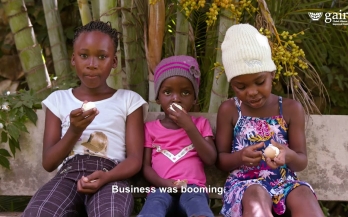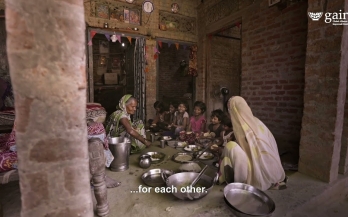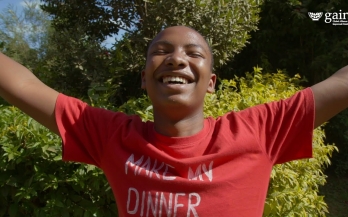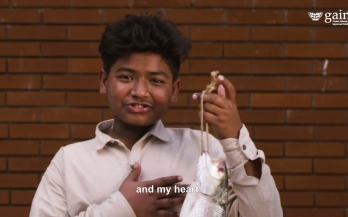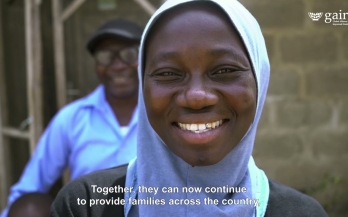

The necessary COVID-19 lockdowns have placed a spotlight on the weaknesses of food systems across the world. GAIN’s response has been geared to protecting the nutrition status of those most threatened and seizing opportunities to build better and more resilient food systems for the future.
In the COVID-19 context the single most important thing that can be done for the health and resilience of people and economies is to protect the nutrition status of current and future generations. We cannot allow the COVID-19 crisis to impact nutrition across the generations.
GAIN’s response has focussed on programmes, policy and evidence and on keeping our people and partners safe, connected and productive.
We have:
- Designed and implemented a new programme: Keeping the food systems working by supporting small and medium enterprises (SMEs) that supply most food for low-income consumers globally
- Recalibrated all of our existing programmes to cope with the new reality, ensuring they remain impactful
- Helped convene the Standing Together for Nutrition (STfN) collaboration, bringing together 50 experts together assess the impact of COVID-19 on nutrition status and identify recommendations for mitigation
- Provided detailed country situation reports on the pandemic’s effect on food systems for countries where GAIN has a significant present
- Convened with key stakeholders and offered thought leadership takes through blogs and webinars contributing to public debates, agenda setting, issues framing, and decision-making - keeping food and nutrition issues uppermost in policymakers minds.
Only by protecting food and nutrition can we deny COVID-19 a terrible inter-generational legacy.
Our response
Keeping Food Markets Working Programme
GAIN has developed the Keeping Food Markets Working (KFMW) programme as an emergency response to the COVID-19 crisis, providing rapid support to food system workers, to small and medium enterprises supplying nutritious foods and to keeping fresh food markets open. While disease control responses to the pandemic are necessary, they also disrupt food systems, depress income and put a strain on social protection programmes. All of these pathways threaten the nutrition status of the most vulnerable. The KFMW programme is focused on mitigating these risks and keeping affordable nutritious foods flowing in African and Asian markets to the people who most need it. The KFMW programme consists of five workstreams for planned interventions:
- Building resilience of small- and medium-sized enterprises (SMEs)
- Maintaining and reinforcing efforts in Large-Scale Food Fortification
- Ensuring food markets stay open and are operating safely
- Investing in nutrition security for key workers in the food system
- Supporting effective policymaking and coordination during the pandemic
To dig deeper into each workstream, click on each slice of the interactive wheel below:
Recalibrating existing programmes
During COVID-19, GAIN reviewed all existing activities to better understand what the pandemic means for each. Lockdown and social distancing measures meant that some activites could no longer proceed as originally planned. We reviewed each programme to determine which could still be delivered and which needed adjustments. We made minor adjustments to most workstreams to address this new operating context and ensure that objectives can still be met.
For example, we made adjustments to the Better Diets for Children programme by shifting our usual in-person engagement to online platforms. In Indonesia we are exploring ways of moving in-person sessions to online platforms to conduct behaviour change interventions, and in Nigeria we plan to utilize social media, online ad placement, video blogs and social media influencers to drive egg consumption for better diets.
For our Large Scale Food Fortification workstream, we are supporting the food business responses to COVID-19 in Bangladesh and Pakistan by designing and disseminating video messages on food safety and disaster preparedness. In Ethiopia, to prevent disruption to the roll-out of our salt iodisation programme, we are seeking a grant to bridge any gaps that may arise as a result of current circumstances.
Large Scale Food Fortification
We are supporting safety training and messaging on COVID-19 prevention at oil and salt production sites in Bangladesh, and for food businesses in Bangladesh and Pakistan. We are also seeking grant support to maintain our salt iodisation programme in Ethiopia.
Better Diets for Children
We are shifting our usual engagement to online platforms, including moving in-person demand-creation sessions in Indonesia online. We’re also leveraging digital platforms (social media, online ads, vlogs) in Nigeria to drive adoption of better egg-based diets for children.
Adolescent Nutrition
With schools closed in Bangladesh, we will utilize online channels to engage with adolescents, champion COVID-19 prevention measures, identify potential suppliers of nutritious food, and gather pledges for the adolescent nutrition campaign.
Workforce Nutrition
We are supporting our employer partners in Bangladesh, India and Kenya with messaging on health and safety while re-entering the workplace. We are also developing videos to promote healthy diets amongst tea workers through social media.
Urban Governance for Nutrition
We will develop a web platform to showcase what cities are doing to improve functioning and resilience of urban food systems, including facilitating cross-city engagement and collaboration.
Commercialisation of Biofortified Foods
We will expand our advocacy efforts in Bangladesh on the immune-system boosting benefits of biofortified zinc rice. We will also disseminate information and hygiene equipment to minimse risk of infection in rural communities.
SUN Business Network
We are developing a COVID-19 focused video to share prepardness and food safety strategies at the retail level for small and medium enterprises (SMEs) and food businesses in Pakistan.
Cross-Portfolio Coordination
GAIN’s staff has shifted to working from home in 15 countries to continue delivering programmes. We are identifying new delivery strategies for short and medium term support to programme partners, while continuing to advocate for an effective response to the food system crisis.
Detailed country sentinel reports on pandemic effect on food systems
These document series summarise some rapid assessments undertaken by GAIN to understand early impacts of the COVID-19 coronavirus pandemic on food systems in a set of low- and middle-income countries.


